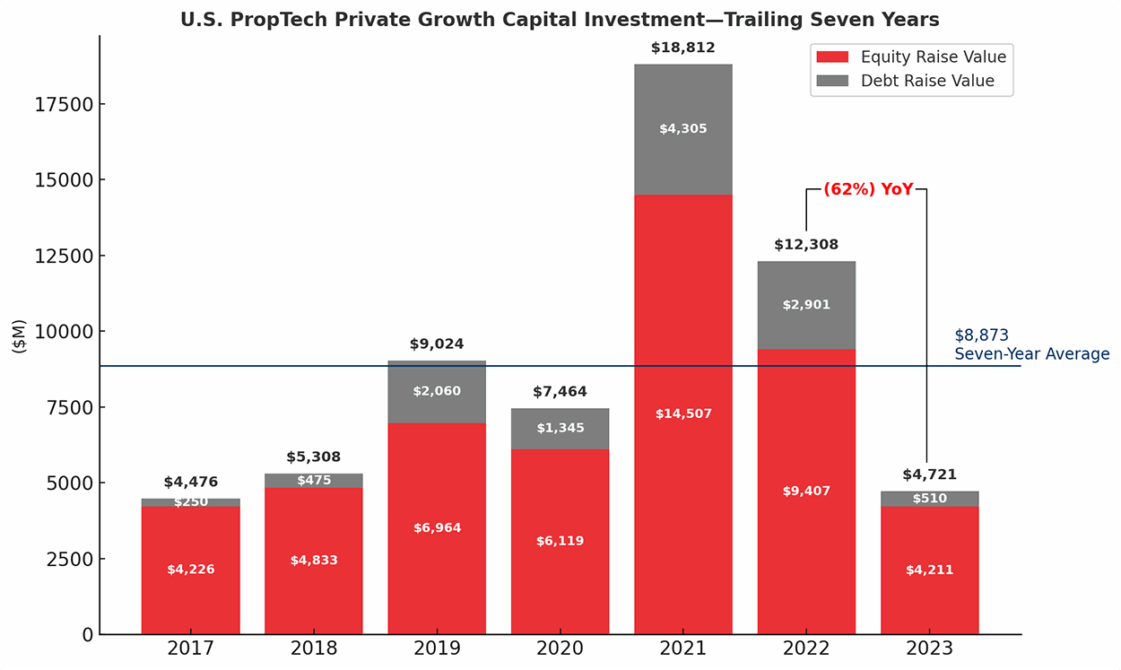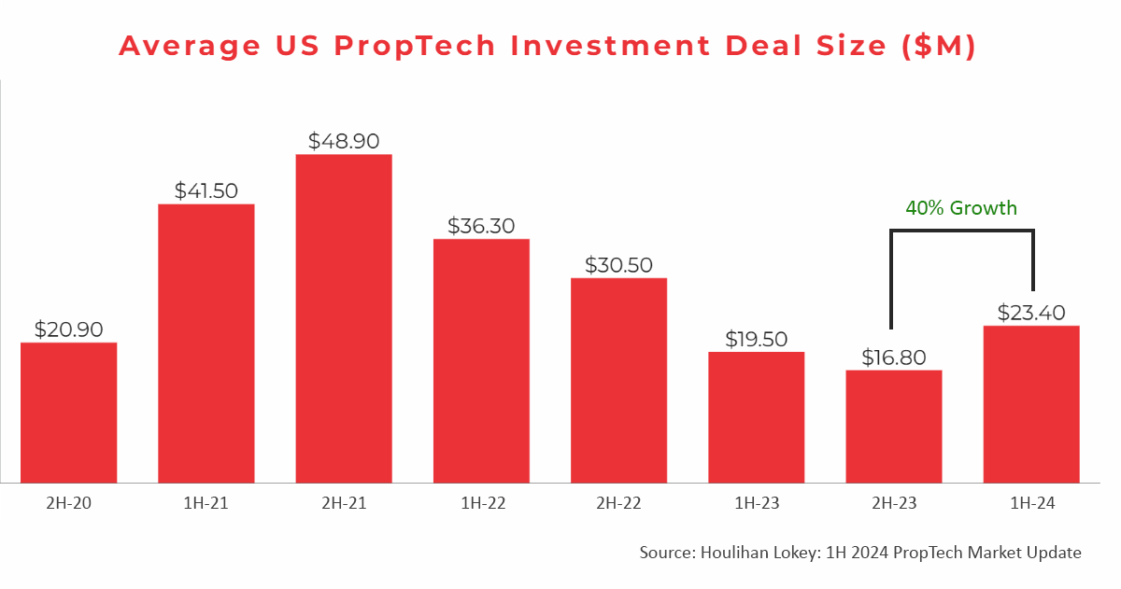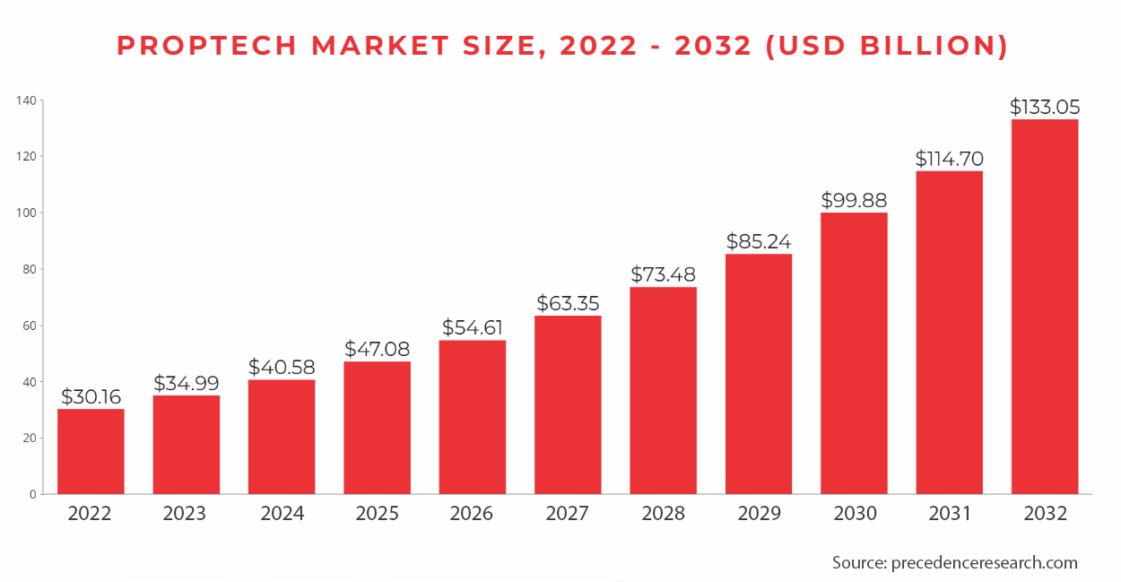“Over the past few years, PropTech has become a major player in real estate game. PropTech comes with strong PR challenges due to the rapid news cycles surrounding this sector, creating a competitive market for attention and visibility for brands. Understanding PropTech market trends is essential for any brand or PR agency looking to launch a campaign.”
Dina Petrosky, Smart Connections PR partner & co-founder.
To define it, PropTech is the use of innovative technology to streamline, enhance, and simplify traditional real estate practices (such as the management, buying, and selling of property). The expansion of PropTech startups has significantly impacted the traditional real estate industry, with these new companies disrupting long-established processes with fresh, tech-driven solutions.
In this report, we examined some of the latest and future PropTech trends across multiple measures of innovation, investment, and interest. Before we dive into trends, we’ll first look at the current state of the PropTech market.
PropTech Market Overview
The market conditions for the PropTech industry has been challenging in recent years, with a report by Houlihan Lokey in 2024 reporting how the US PropTech market experienced macroeconomic uncertainty mostly due to rising interest rates, and a tightening of the real estate market, leading to a year on year decline of 62% in private growth capital investment between 2022 and 2023:

However, a 1H 2024 PropTech market update report again by Houlhian Lokey saw an increase of $2.0 billion in growth equity and debt investment in the market, with a 40% growth in investment deal size compared to 2H 2023:

Other market reports forecast that the global PropTech market is expected to rise to $40.5 billion in 2024, with a forecasted $133.05 billion market by 2032.

As the PropTech market has grown over the last few years, a number of key market themes have risen across sectors utilizing PropTech, such as:
- AI, Big Data, & Machine Learning Are Key Innovation Enablers
Companies like Rightmove in the UK, Beike in China, and Zillow in the U.S. are using machine learning, big data, and AI to drive innovation. For instance, generative AI is projected to have a market size of $1,047 million by 2032.
- Companies Are Integrating GreenTech & Other Sustainable Practices
Not surprisingly, the emphasis on sustainability is growing in the PropTech market. As a result, startups are trying to embed green technologies into their platforms to reduce environmental impacts and help companies reach their sustainability goals.
- Consumers Are Demanding More Integrated IoT-Based Technologies
IoT devices are becoming standard features in new developments, offering enhanced security, improved energy management, and greater convenience.
Current Trends In PropTech
These are some of the most prominent PropTech dictating market evolution:
Digital Deals: The Rise of eSigning and Blockchain
New technologies like eSigning, virtual notarizations, and blockchain are gaining momentum in 2025, making property transactions close faster, be more secure, and borderless. Deals are becoming more streamlined, transparent, and far less dependent on traditional paperwork or in-person processes:
- eSigning and Virtual Notarizations: eSigning means you no longer need to be physically present to close deals. Buyers can now sign documents from anywhere in the world using popular tools like DocuSign. This helps speed up transactions and cut down on paperwork.
- Blockchain Integration: Imagine a world where property transactions and security are as transparent as your bank statement. Blockchain is making this a reality by creating secure, tamper-proof records for every transaction. For example, platforms like Propy are already using blockchain to facilitate international property deals. It ensures that every record is verifiable and secure.
Smart Property Management At Your Fingertips
What’s so interesting and useful is that AI in PropTech is helping to automate standard, repetitive tasks, including tracking rent payments or maintenance requests. Tools like automated tenant communication systems send reminders, collect payments, and schedule repairs without property managers lifting a finger. Here are a few use cases:
- Predictive Maintenance: AI does more than react; it predicts. AI can use data from IoT devices to anticipate problems before they happen. For example, it can predict when a heating system might fail and schedule maintenance. This can help save costly emergency repairs.
- Enhanced Security: AI can keep your property safe effortlessly. AI-enhanced security systems can help monitor video feeds 24/7. They can also spot and report unusual activity, far quicker than any human could.
- Cut Costs, Not Corners: AI can automate daily tasks, helping reduce labor costs and streamline operations.
- Personalize Tenant Interactions: AI can make every tenant feel like the only tenant in a building. This includes everything from automated messages that greet new renters to smart systems that suggest local coffee shops or events based on tenant preferences. AI can help build communit and enhance relationships between property managers and tenants.
Fractional Ownership and Crowdfunding Is On The Rise
Imagine owning part of a commercial property alongside other investors, sharing the returns and responsibilities. This is exactly what fractional ownership offers.
Fractional ownership allows average investors to enter the market via high-value property. For instance, owning a share in a prime office building and receiving regular rental income without needing to buy the entire property.
In addition to this, crowdfunding platforms allow people to invest small amounts in various real estate projects. Whether it’s a new development or a renovation, these platforms pool money from multiple investors to fund projects. This makes it easier for the average investor to enter the real estate market.
Smart Homes Are Improving Property Value and Attracting Buyers
More buyers are asking for homes with smart features included. These features significantly enhance a property’s value and draw the buyer’s interest. Many smart homes today provide features including:
- Automated lighting.
- Energy-efficient systems.
- Security devices.
- Voice-controlled assistants.
- Health monitoring sensors.
- Automated blinds or shades.
As these technologies become more affordable and accessible, buyers increasingly view them as essential rather than luxury add-ons.
The Rise Of Instant Home Buying and Selling Platforms
iBuyers or “instant buyers” provide a streamlined (and efficient aspect to the) selling process. Their business model relies on algorithmic pricing tools to assess property values and make cash offers directly to homeowners.
Here’s how iBuyers operates in the real estate market:
- Homeowners can enter details about their property on an iBuyer’s website. The app makes sure the homeowner receives an offer quickly (often within 24-48 hours.)
- iBuyers use automated valuation models (AVMs) that analyze data. This data includes location, market conditions, and property specifics. They then use this data to determine the fair market value of a home.
- If homeowners accept the offer, the iBuyer purchases the home directly. This can speed up the transaction process compared to traditional real estate sales.
- After purchasing a property, iBuyers may make necessary repairs or upgrades. They can then quickly list the property for sale.
Some of the popular iBuyers include companies like Opendoor, Zillow Offers, RedfinNow, and Offerpad. These tools are now gaining momentum as the trend gains popularity. This rapid and hassle-free method appeals to those who need to relocate swiftly and quickly.
Virtual and Augmented Reality in Real Estate
New houses are often sold unfurnished. But what if you could show the buyers what life will be like once they set up their furniture in the house? Many companies are making this possible through AR and VR experiences.
VR and AR help showcase, market, and visualize properties more visually. With VR technology, real estate managers can provide a tour of a home to anyone and anywhere in the world.
Take RoOomy, for instance, an international VR company that’s setting the standard in virtual staging. Its innovative service brings furniture, interior designs, and appliances to life through virtual reality. This allows them to create detailed, immersive showcases that appeal to global customers.
Future PropTech Trends for 2026 and Beyond
Here are some future trends that are expected to shape the PropTech market in the coming years.
Increased Use & Evolution Of AI
AI has already had a significant impact on the PropTech industry, and this will continue to rise in the future. AI will have numerous use cases, including:
- AI Real Estate Search: AI enables the search of properties using natural language. For example, typing “I need a two-bedroom apartment close to downtown but in a quiet area,” and AI search tools will filter through listings to find users their perfect match.
- AI Property Price Valuation: AI helps assess property values instantly, ensuring people pay or charge a fair price. This tool analyzes market data to provide accurate estimates, making it invaluable for buyers, sellers, and renters seeking the best deals.
- AI User Preference Analysis: Imagine a search that remembers user’s preferences! AI learns from people’s past searches (like needing a pet-friendly space or a large backyard) and automatically prioritizes similar features in future searches, personalizing experiences without extra effort from users.
- AI Demand Forecasting: This AI functionality predicts how popular a property or location might be, helping investors and landlords understand market trends. Relevant stakeholders can use these insights to strategize investments or develop marketing material tailored to likely buyer or renter interests.
- AI Automated Translation: This enables access to global property markets effortlessly. This automated AI tool translates listings, legal documents, and communications instantly, ensuring you can invest in, sell, or manage properties worldwide without miscommunication.
Advanced Analytics Will Significantly Shape The Future Of PropTech
Advanced analytics enables more precise decision-making and operational efficiency. It can help optimize property management, investment strategies, and customer engagement.
Advanced analytics allows:
- The use of insights gained from the market data to guide investment choices.
- Streamline operations, from scheduling repairs to tracking rent payments, all while reducing costs.
- Identify and assess potential risks before they negatively impact business operations.
- Understand what a tenant needs and expects, helping property managers tailor services to keep positive relations with tenants.
Blockchain Technology Will Continue To Revolutionize The Real Estate Industry
Blockchain can significantly enhance transparency and speed up transactions. This innovation ensures that once a property’s records are securely logged on the blockchain, they are immutable. This greatly reduces paperwork delays and fraud risks.
Here’s how blockchain will transform real estate transactions:
- Secure Ownership Records: Blockchain locks in property details permanently. This ensures every transaction made is clear and secure.
- Streamline Transactions: Blockchain speeds up deals by quickly verifying and closing them. This process bypasses traditional delays, saving time for all parties involved.
- Reduce Fraud Risks: Blockchain’s system is transparent and tamper-proof. It significantly lowers the risk of fraud, making transactions safer.
- Cut Down Paperwork: Say goodbye to extensive paperwork. Blockchain can help automate and protect documents, simplifying the buying and selling process.
Embracing The Future of PropTech
The rapid growth and evolution of PropTech are reshaping the real estate industry at an unprecedented pace, with an increasing forecast market size rising year on year to at least 2032. From AI-driven property management and blockchain-enhanced transactions to the integration of sustainable practices and smart home technologies, PropTech innovations are streamlining operations, enhancing security, and transforming how properties are bought, sold, and managed.
As these technologies continue to evolve, they will not only meet the changing demands of consumers but also revolutionize the future of real estate, offering immense opportunities for stakeholders and investors alike.
This evolution brings unique PR challenges, as brands face fierce competition for attention in a fast-moving market. At Smart Connections PR, we know the journalists, publications, and PropTech sector to help brands be seen and scaled up through media coverage in high profile publications.
If you’re interested in a PropTech PR campaign with us, get in touch via our contact us page.




